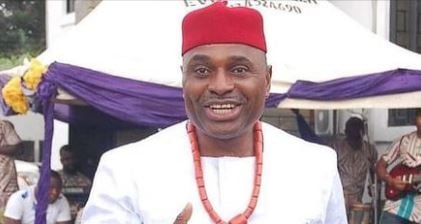Kenneth Okonkwo, a prominent figure in the Nigerian entertainment industry and political landscape, has made a bold prediction regarding the future of the African Democratic Congress (ADC) and the nation’s political trajectory. He confidently asserts that the ADC is poised to emerge victorious in the 2027 general elections, unseating the current administration led by President Bola Tinubu. Okonkwo, speaking on a nationally televised program, expressed his unwavering belief in the ADC’s potential to capture power, emphasizing that the party’s true strength would be manifest in the forthcoming elections. He distanced the party’s current leadership from the outcomes of recent by-elections, arguing that those results do not reflect the party’s prospects under the newly appointed leadership of David Mark.
Okonkwo’s optimism stems from the recent restructuring and revitalization efforts within the ADC. He believes that the party’s renewed focus and strategic direction under Mark’s leadership will be instrumental in achieving electoral success in 2027. He maintains that the by-election results, where the ADC failed to secure any seats, are not indicative of the party’s true potential. He attributed the party’s lackluster performance to the fact that the primaries for those elections were conducted prior to the current leadership assuming office. He underscored that the ADC’s participation in those elections was essentially inherited from the previous leadership and, therefore, should not be considered a reflection of the party’s current trajectory.
Okonkwo’s conviction in the ADC’s potential to form the next government is further bolstered by his assessment of the party’s expanding national presence. He confirmed that the ADC has established a robust organizational structure across all 36 states of the Federation, a development which he believes is critical for effective grassroots mobilization and electoral competitiveness. This nationwide presence, he argues, will enable the ADC to effectively connect with the electorate and disseminate its message, ultimately translating into electoral gains. He specifically highlighted the party’s presence in Rivers State, a key political battleground, and identified Rotimi Amaechi, a prominent political figure, as the head of the party in the state.
The by-election results, while disappointing for the ADC, have not dampened Okonkwo’s confidence in the party’s prospects. He maintains that the 2027 elections will be the true test of the ADC’s strength and organizational capacity. He believes that the party’s new leadership, coupled with its expanding national network, will be pivotal in achieving a decisive victory. His vision for the ADC extends beyond simply participating in the elections; he envisions the party forming the next government and ushering in a new era of political leadership in Nigeria.
Okonkwo’s declaration represents a significant statement of intent from the ADC. It signals the party’s ambition to not merely be a participant in the political process but a leading force capable of challenging the established political order. His confident prediction, however, remains to be tested in the crucible of the 2027 elections. Whether the ADC can translate its aspirations into electoral reality will depend on a multitude of factors, including the party’s ability to effectively mobilize its base, articulate a compelling vision for the nation, and navigate the complexities of the Nigerian political landscape.
The upcoming 2027 elections promise to be a pivotal moment in Nigeria’s political history. The outcome of these elections will determine the direction of the country for the foreseeable future. The ADC, under its new leadership, has positioned itself as a viable alternative to the ruling party, and its success or failure will undoubtedly shape the political discourse and power dynamics in the years to come. Okonkwo’s confident pronouncements underscore the high stakes of the upcoming elections and the intense competition that is likely to ensue.














